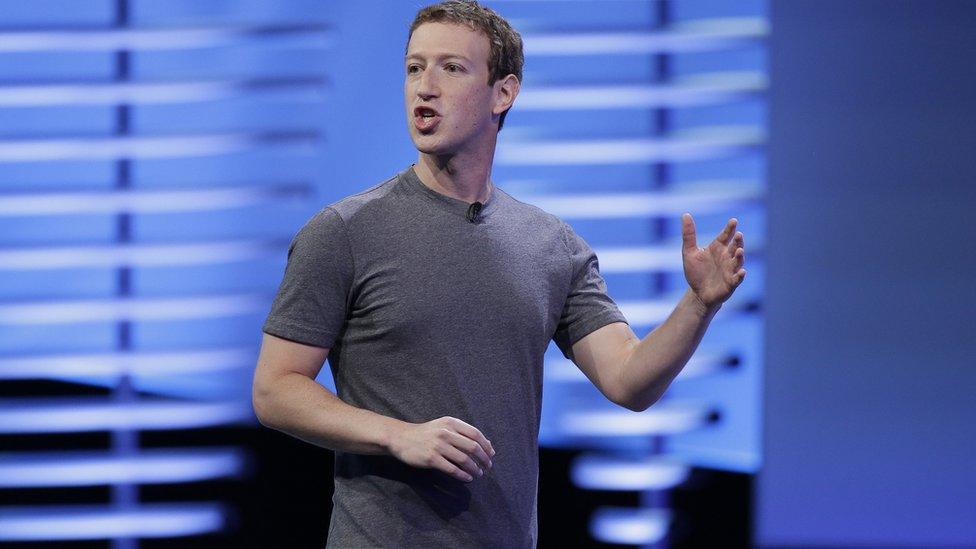Facebook: Social network, media company - or both?
- Published

Mark Zuckerberg has insisted fake news is a very small part of Facebook
Is Facebook a media company?
This abstract question may strike you as the preserve of Palo Alto wannabes, Lower East Side podcasters, and media navel-gazers closer to home.
In fact the answer, while complex, goes to the very essence of democracy in our time.
And you cannot understand Thursday's announcement from the company, about its clampdown on fake news, without answering the prior question above.
The measures Facebook is taking - which range from making it easier to flag fake news to hurting the finances of fake news generators - while welcome, stop short of what some critics would like to see.
The revolution in media means that platforms like Facebook are increasingly doing what publishers do.
As Tony Haile argued in a recent episode, external of the Wall Street Journal's superb Media Mix podcast, "Publishers do five things: they create, post, curate, distribute and monetise content. Facebook now does four of those five... [But] they don't create."
I think even this point is debatable. It is true that Facebook doesn't commission original content, or journalism. But the advent of Facebook Live brings them very close to doing this.

Lavish Reynolds broadcast the moments after her boyfriend was shot
When Lavish Reynolds used that tool to produce an astonishing broadcast, external of the moments after her boyfriend Philando Castile was shot by a Minnesota Police officer, she was clearly broadcasting live news.
Of course Facebook didn't ask her to; but through Facebook Live, as through the social network's Instant Articles feature, Facebook facilitates original journalism, much as Amazon helped entrepreneurs with its Web Services technology.
Funded by advertising; helping to create vast amounts of stories; the main source of news for millions around the world. That sounds like a media company, doesn't it?
And yet Facebook doesn't see it that way, in one vital respect. It doesn't want to use human judgement to arbitrate between truth and falsehood.
On Wednesday I spoke at length to Adam Mosseri, Vice President of Product for News Feed at Facebook. He briefed me on Facebook's latest efforts to clamp down on the fake news which, some argue, helped Donald Trump to enter the White House.
Mark Zuckerberg initially described such a claim as "crazy", but has since tried to demonstrate he takes the issue seriously. Hence the announcement that Facebook will do four things:
Make it easier for users to report material they think fake.
Use third-party fact-checking organisations - Snopes; FactCheck; PoliticoFact; ABC News - to verify suspicious content.
Investigate more closely articles that are not being shared by people after they have read them.
Hurt the finances of fake news providers by raising the bar of who is allowed to advertise on Facebook.
Together, these measures will make a difference. As Zuckerberg has argued, and Mosseri re-iterated, fake news is a very small fraction of the material shared by the Facebook community, and weeding it out completely is impracticable.
Arbiters of truth
But there is one, fascinating, vital respect in which Facebook will not do what its critics want.
It will not ask staff to make a call on what is true or false. In other words, it will not employ editors.
As Mosseri said to me in relation to the above, this effort to clamp down on fake news is "algorithmic" - Facebook will rely on algorithms, and the judgement of its community of users, to flag potential fake news. It won't make those decisions for itself, using its own staff.
Years ago, Zuckerberg described Facebook as a utility company, external. Then some smart people pointed out that utilities operate in a regulatory environment.
So the emphasis changed to it being a technology company. Just this August, Zuckerberg said, external "we are a tech company, not a media company" in Rome.
But Facebook's impact on the media industry has been revolutionary, gobbling up advertising and enticing vast new audiences.
Every day there are several pieces bemoaning the duopoly that Facebook and Google allegedly have over the media industry. Those complaints unite the New York Times, external with The Sun, external.
So while Facebook claims not to be a media company, the impact that it has on other media companies, together with its role in disseminating false information, will mean that publishers continue to condemn it.
They argue that Facebook may be one of the world's greatest companies, but it is shirking a crucial public duty - namely, to be arbiters of truth.
The world's biggest platform, increasingly, has the role once fulfilled by news publishers, without the legal restrictions and social obligations.
In short, Facebook is a media company - even though it doesn't want to be.
- Published11 November 2016